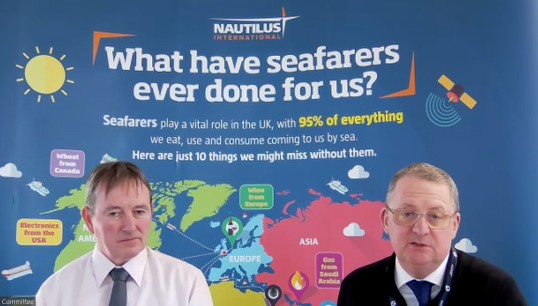Nautilus members vote to support RFA personnel and monitor AI in maritime at UK Branch Conference
20 November 2024

Nautilus International members at the Union’s UK Branch Conference – held online on 20 November 2024 – have voted unanimously for a motion reaffirming support for striking seafarers at the Royal Fleet Auxiliary (RFA), and a motion committing Nautilus to campaign for the responsible use of artificial intelligence in the maritime industry.
Motions are proposals for policies that members want to be adopted by their Union. If a majority of members at a quorate meeting vote in favour, then the motion becomes official Union policy.
Solidarity with RFA members
The motion on the RFA notes that – despite the long hours and risks taken by personnel at the service – personnel are currently overworked, undervalued and underpaid.
By passing the motion, members have reaffirmed the full support of the UK Branch for RFA members in their ongoing dispute with the MOD and RFA and in their fight for fair pay and improved working conditions.
The motion also calls upon the UK government to recognise the invaluable contribution of RFA personnel and boost pay and conditions to reflect their vital role in national security.
Responsible use of AI
The other motion passed at the Branch Conference notes that AI offers many potential benefits, but that some shipowners are already making efforts to relax requirements regarding watchkeeping standards on the bridge – assuming that these systems will be as effective as a trained seafarer.
It therefore commits the Union to take immediate action to protect the interests of seafarers and to implement safeguards that will facilitate the responsible and beneficial rollout of AI technology in ways that enhance safety and working conditions.
Following this motion, the Nautilus Council is now tasked with campaigning for:
- the responsible integration of AI in ways that respect the expertise of maritime professionals, where AI serves as a supportive tool to enhance decision-making rather than a means of cost-saving or replacing skilled seafarers
- the Maritime & Coastguard Agency to push the International Maritime Organization (IMO) to establish stringent performance standards for AI systems used in safety-critical decision making including rigorous testing in real life conditions
- continuous training and upskilling for UK seafarers and maritime professionals to ensure they are prepared for new AI technologies
Tags
More articles
Glimpsing our maritime future: the 2024 Nautilus UK Branch Conference
Guest speakers grapple with AI at Nautilus UK Branch Conference
RFA officers overwhelmingly vote to continue strike action
Nautilus International members at the Royal Fleet Auxiliary (RFA) have voted by an overwhelming majority to continue both strike action and action short of strike.
